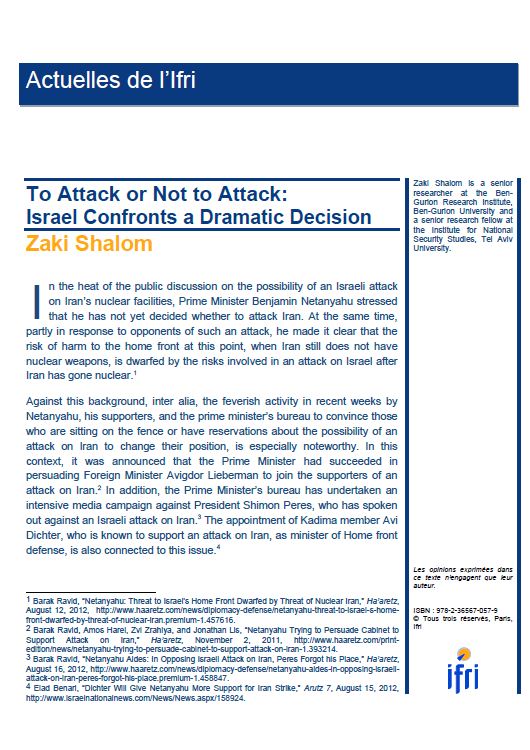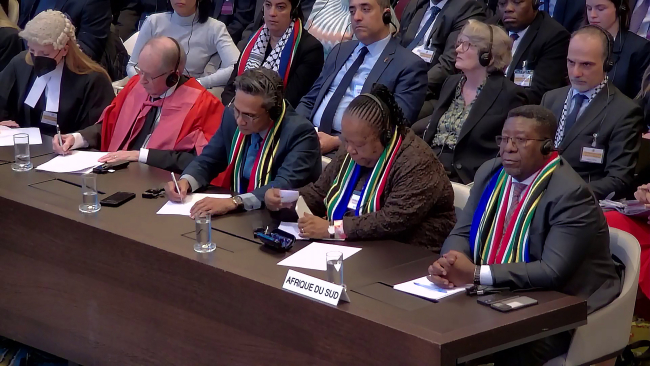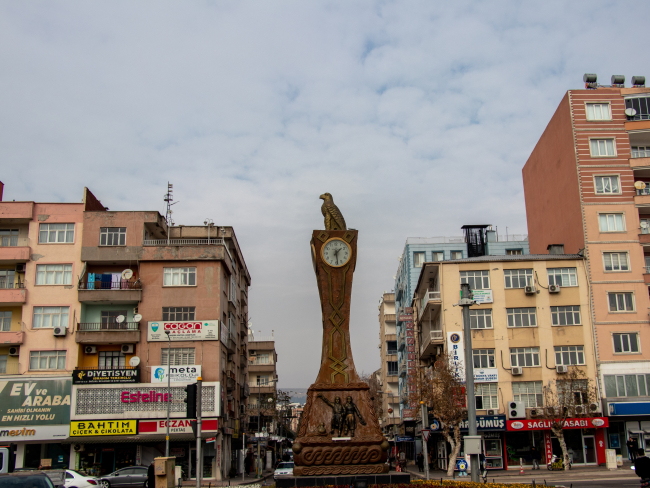To Attack or Not to Attack: Israel Confronts a Dramatic Decision

In the heat of the public discussion on the possibility of an Israeli attack on Iran’s nuclear facilities, Prime Minister Benjamin Netanyahu stressed that he has not yet decided whether to attack Iran. At the same time, partly in response to opponents of such an attack, he made it clear that the risk of harm to the home front at this point, when Iran still does not have nuclear weapons, is dwarfed by the risks involved in an attack on Israel after Iran has gone nuclear.
Against this background, inter alia, the feverish activity in recent weeks by Netanyahu, his supporters, and the prime minister’s bureau to convince those who are sitting on the fence or have reservations about the possibility of an attack on Iran to change their position, is especially noteworthy. In this context, it was announced that the Prime Minister had succeeded in persuading Foreign Minister Avigdor Lieberman to join the supporters of an attack on Iran. In addition, the Prime Minister’s bureau has undertaken an intensive media campaign against President Shimon Peres, who has spoken out against an Israeli attack on Iran. The appointment of Kadima member Avi Dichter, who is known to support an attack on Iran, as minister of Home front defense, is also connected to this issue.
Undoubtedly, the Iranian issue presents Israeli decision makers, and in particular, Prime Minister Netanyahu, with a magnitude of fateful decisions. We believe that the public discussion of this issue is positive in and of itself in a democratic society like Israel. Nevertheless, it is likely to cause damage to the country if it spills over into detailed information about operational issues, and especially, if Israel’s capabilities and limitations vis-à-vis Iran are discussed. As long as it remains on the political level and does not get into details of limitations and capabilities, it must be conducted within a serious framework for discussion, professional and politically impartial. Within this framework, it is legitimate for there to be disagreements. Below we will attempt to examine the main questions the Prime Minister will seek to answer when he decides about an attack on Iran.

Available in:
Regions and themes
ISBN / ISSN
Share
Download the full analysis
This page contains only a summary of our work. If you would like to have access to all the information from our research on the subject, you can download the full version in PDF format.
To Attack or Not to Attack: Israel Confronts a Dramatic Decision
Related centers and programs
Discover our other research centers and programsFind out more
Discover all our analysesHow to Jumpstart Economic Recovery in Syria? The role of syrian entrepreneurs in Turkey
This report examines the potential role of Syrian-partnered companies operating in Türkiye in supporting economic recovery and reconstruction efforts in Syria. Based on data collected through field research and surveys conducted by the Economic Policy Research Foundation of Türkiye (TEPAV), the report provides an overview of the business characteristics, sectoral distribution, and cross-border economic activities of Syrian entrepreneurs. The report explores how this business activity could contribute to restoring supply chains, stimulating local production, and generating employment.
Indonesia and the Palestinian Cause
During his inaugural presidential speech on October 20, 2024, Indonesia’s incumbent president, Prabowo Subianto, iterated certain principles central to the philosophical foundation of the Indonesian nation. He noted Indonesia’s longstanding foreign policy of non-alignment or “bebas dan aktif” (free and active) and its aversion to military pacts.
Middle Power Lawfare : South Africa, International Justice, and the Gaza Crisis
The intensification of violence in Gaza following Hamas’s 7 October 2023 Al Aqsa Flood attack and Israel’s military response prompted a broader reassessment of global diplomacy. Longstanding geopolitical alignments were disrupted, and questions about humanitarian obligations, institutional accountability, and the limits of state conduct returned to the centre of international debate.
Adıyaman, the “Ownerless City”: Story of a Political Emancipation
Over the past two years, the city of Adıyaman has made headlines for two major reasons: first, its devastation by the earthquake of February 6, 2023, which struck between Turkey and Syria, and second, its significant political shift following the municipal elections of March 31, 2024.









